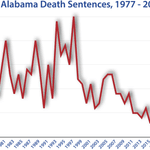
State & Federal
Alabama

History of the Death Penalty
Alabama’s first execution was carried out in 1812. From 1812 to 1927, the primary method of execution was hanging. In 1927, the electric chair, known as “Yellow Mama,” was introduced. Today, the primary method is lethal injection, although inmates convicted prior to 2002 can choose to be executed by electrocution or lethal injection.
Timeline
1812 – First known execution in Alabama, Eli Norman hung for murder.
1927 – Alabama replaces hanging with electrocution as its method of execution.
1972 – The Supreme Court strikes down the death penalty in Furman v. Georgia.
1976 – Alabama passes a law reinstating capital punishment. The Supreme Court soon after reinstates the death penalty when it upholds Georgia’s statute in Gregg v. Georgia.
1983 – John Evans III is the first person executed in Alabama after Gregg.
2002 – Alabama electrocutes Lynda Lyon Block, the last person to undergo that punishment involuntarily in the state. Alabama subsequently made lethal injection its default execution method, but continued to allow inmates to select electrocution.
2006 — Alabama judge imposes the death penalty on Oscar Doster, despite a unanimous jury vote for a life sentence.
2011 — Alabama executes Jason Williams using a secret combination of illegally purchased drugs after the DEA previously seized Alabama’s illegally obtained supply of sodium thiopental, one of three drugs used in lethal injection.
2012 — The Supreme Court holds that mandatory life without parole sentences for children 17 or younger convicted of homicide is unconstitutional in Miller v. Alabama and its companion case, Jackson v. Hobbs.
2013 — The Alabama House of Representatives votes unanimously on a bill to posthumously pardon the “Scottsboro Boys.” The nine black men were teenagers when they were wrongfully convicted for the rape of two white women in 1931 and held in prison for a collective 130 years.
2016 — The Supreme Court orders Alabama to reconsider its death penalty sentencing procedure after vacating Alabama’s decision to uphold a death sentence for Bart Johnson. Mr. Johnson’s sentence was imposed by a trial judge after a 10 – 2 non-unanimous jury vote, violating the Supreme Court’s decision in Hurst v. Florida.
2018 — Alabama authorizes the use of nitrogen gas as a method of execution.
2018 — Alabama botches the attempted execution of Doyle Hamm. It took the execution team nearly two and a half hours to insert an IV to administer lethal injection, puncturing Hamm in the bladder and femoral artery, resulting in severe bleeding.
2019 — A unanimous decision from the U.S. Court of Appeals for the Eleventh Circuit requires that Alabama reveal critical components of its highly secretive lethal injection execution procedure to the general public.
2022 — Alabama carries out the longest botched lethal-injection execution in U.S. history, taking three hours to set an IV line in the execution of Joe James.
2022 — Governor Kay Ivey halts executions after a series of failed and botched executions, including that of Kenneth Smith, Joe James, and Alan Miller. Gov. Ivey calls for Alabama Department of Corrections to carry out internal review of execution protocol.
2023 — The Alabama Supreme Court eliminates automatic plain error review for trial errors in death penalty cases. The court will no longer be required to read capital case transcripts to see if there are any errors that may have adversely impacted the rights of capital defendants.
Famous Cases
In 1931, nine black boys were charged with raping two white girls. They were tried in Scottsboro, Alabama, and became known as the Scottsboro Boys. All-white juries sentenced eight of the boys to death. The cases were heard by the U.S. Supreme Court in Powell v. Alabama (1932), the landmark case which guarantees the right to counsel in a capital trial. After numerous retrials, only one of the boys was sentenced to death, but his sentence was later commuted to life in prison.
Cornelius Singleton, an inmate with an IQ of 55, was executed November 20, 1992.
Darrell B. Grayson, an African-American man, was convicted by an all-white jury for the murder of a white woman. The Innocence Project sought DNA testing in Grayson’s case, saying that testing not available at the time of his trial might prove him innocent. Requests for new testing were denied, and Grayson was executed on July 26, 2007.
Holly Wood was executed September 9, 2010 despite evidence that he was intellectually disabled, and therefore exempt from execution. His lawyer did not present evidence of Wood’s low IQ during Wood’s original trial. A federal District Court overturned Wood’s sentence, but the U.S. Supreme Court agreed with the ruling from the U.S. Court of Appeals for the Eleventh Circuit that Wood failed to show that the lawyers were constitutionally ineffective.
Walter Moody was executed April 19, 2018. At 83 years old, Moody was the oldest person and only octogenarian put to death in the United States since executions resumed in 1977.
Dominique Ray was executed February 2, 2019 without his chosen religious advisor present. Alabama’s execution protocol mandated that a prison chaplain — and no other religious adviser — be present in the execution chamber, but the state employed only Christian chaplains. Ray, who was Muslim, requested that an imam be allowed in the execution chamber. In a contentious 5 – 4 decision, the U.S. Supreme Court vacated a federal appeals court stay of execution and permitted Alabama to carry out the execution.
Notable Exonerations
Walter McMillian was sentenced to death in 1988 despite the jury’s recommendation for a life sentence. An investigation by 60 Minutes uncovered prosecutorial misconduct and perjury by witnessess. McMillan was released from prison in 1993.
Anthony Ray Hinton was exonerated in 2015 after having spent 30 years on death row. He was sentenced to death by the court in the 1985 murders of two fast-food restaurant managers, after a 10 – 2 recommendation of death by the jury. The prosecutor (who was white) had a documented history of racial bias, and claimed he could tell Hinton (who is black) was guilty and “evil” just by looking at him. Hinton was arrested after a victim in a similar crime erroneously identified him in a photo array, even though Hinton proved he was at work 15 miles away when that murder took place. The conviction was based in large part upon scientifically invalid testimony of a state forensic examiner that the bullets in the two murders came from a gun that was found in Hinton’s house. In 2002, three leading firearms examiners testified that the bullets used in the murders could not be matched to Hinton’s gun, and may not have come from a single gun at all. For the next thirteen years, Alabama nevertheless continued to oppose efforts to overturn his conviction and death sentence.
Milestones in Abolition/Reinstatement
Senator Hank Sanders has introduced a moratorium bill for the past 10 years. Representative Merika Coleman has introduced a moratorium bill for the past 5 years.
Other Interesting Facts
Until 2017, Alabama allowed the practice of judicial override, in which judges could override a jury’s sentencing recommendation even when the jury had recommended a life sentence. Alabama still allows a judge to impose a death sentence without a unanimous jury recommendation for death if at least 10 of 12 jurors recommend a death sentence.
From 1927 – 1976 there were 153 executions. Of those, 126 were African American, 27 were Caucasian. 3 were female.
Alabama is the only state whose anti-death penalty organization (Project Hope to Abolish the Death Penalty) was founded by death row inmates in 1989. The Chairman and Board are at Holman Prion on death row.

Resources

Alabama Execution Totals Since 1976
News & Developments
News
Oct 27, 2025
Alabama Execution Witnesses Report “Violent Thrashing” of Prisoner and More Than 225 “Agonized Breaths” in Nitrogen Gas Execution
On October 23, 2025, Alabama executed Anthony Boyd, despite his unwavering claim of innocence and a fiery dissent authored by U.S. Supreme Court Justice Sonia Sotomayor, renewing the serious concerns that have been consistently raised about the state’s use of nitrogen gas. Justice Sotomayor, joined by Justices Kagan and Jackson, dissented from the Court’s October 23, 2025, denial of a stay of execution, writing that Alabama’s use of nitrogen gas“violates the Constitution…
Read MoreNews
Oct 21, 2025
Despite Serious Concerns about Trial’s Fairness and Anthony Boyd’s Innocence, Alabama Plans to Execute Him Using Nitrogen Gas
Anthony Boyd is scheduled to be executed in Alabama on October 23, 2025, for his role in the 1993 kidnapping and murder of Gregory“New York” Huguley. Mr. Boyd was convicted based solely on eyewitness testimony with no physical evidence linking him to the crime, and he has maintained his innocence. Alabama will execute Mr. Boyd using nitrogen gas, the seventh time state has used this controversial method since January 2024, when the state executed Kenneth Smith in…
Read MoreNews
Sep 22, 2025
Victims’ Families in Kirk and Berry Cases Cite Religious Reasons for Opposition to the Death Penalty
Murder victims’ family members hold a wide range of views about what justice means. For some, the death penalty holds the promise of closure, while for others, it is a source of continued trauma and uncertainty. In two recent cases, victims’ family members have publicly expressed their opposition to the death penalty, citing their religious views and need to forgive. Will Berry was just 11 years old when Geoffrey West shot and killed his mother, Margaret Parrish…
Read MoreNews
Jul 31, 2025
Alabama Circuit Court Judge Stays Execution Because of Concerns with Prisoner’s Mental Competency
In a July 10, 2025, order, Marion County Alabama Circuit Court Judge Talmage Lee Carter issued a temporary stay of execution for David Lee Roberts because of concerns regarding his mental competency. Mr. Roberts was scheduled to be executed on August 21. Judge Carter’s order tasked the Alabama Department of Mental Health with determining whether Mr. Roberts has a“rational understanding” about why the state will execute him. In his order, Judge Carter wrote, “[t]he issue…
Read MoreNews
Jun 04, 2025
2025 Roundup of Death Penalty Related Legislation
More than one hundred bills have been introduced this year in 34 states and in Congress to expand and limit use of the death penalty, abolish and reinstate the death penalty, modify execution protocols and secret the information about them, and alter aspects of capital trials. Thus far, nine bills in five states have been enacted, with Florida enacting the most legislation. Of the bills that have been signed into law, three modify execution protocols; two expand…
Read More